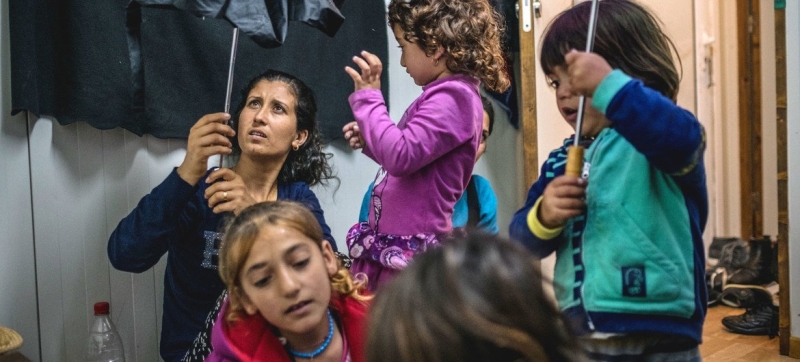
A Yazidi family in a refugee camp in Greece. (Archive) 10 years after the Yazidi genocide, UN Commission of Inquiry on Syria calls for justice International Law
Ten years after ISIS militants attacked the Yazidis in Iraq’s Sinjar and devastated the lives of a community of 400,000, the UN Commission of Inquiry on the Syrian Arab Republic is calling for justice and accountability for ISIS crimes.
The Commission’s experts said that the surviving victims of these crimes, as well as women and children held solely for their alleged affiliation with ISIS, must be immediately released from illegal detention in north-east Syria and repatriated.
“The Yazidi tragedy, which is still ongoing, is also another reminder that alleged ISIS members from third countries detained in north-east Syria must be repatriated and held accountable for international crimes, including gender-based crimes, in national courts. We stress that the survivors must play a central role in this effort,” said Commission President Paulo Pinheiro.
On August 3, 2014, ISIS captured the Yazidi town of Sinjar in northwestern Iraq, near the border with Syria. The commission documented that ISIS committed genocide, as well as numerous crimes against humanity and war crimes, including mass executions, forced conversion to Islam, enslavement, and sexual violence against women and girls.
Following the attack on Sinjar, ISIS forcibly transported thousands of captured Yazidis to Syria, where girls as young as nine were subjected to sexual slavery and Yazidi boys as young as seven were forcibly trained as fighters and suicide bombers.
ISIS militants who controlled northeastern Syria systematically discriminated against women and girls as part of their genocidal campaign, holding them in sexual slavery, torturing them, inhumanely treating them, raping them, and killing them. Women and girls were forced to marry militants and stoned to death for alleged adultery.
ISIS placed women and girls under the control of male relatives, restricted their freedom of movement, and excluded them from public life. Women and girls who violated the strict dress code imposed by ISIS militants were flogged as punishment.
Read also:
UNICEF welcomes Tajikistan’s repatriation of 32 children and 15 women from Syria
The commission’s experts called for increased efforts to identify and release Yazidis held in camps in north-east Syria. Commission member Hanni Megally said the Yazidis should be given a “meaningful choice” about returning to Iraq, being reunited with family members or being resettled in third countries with their children. “[UN] Member States must facilitate these opportunities,” Megally said.
For those members of the Yazidi community who wish to remain in Syria or return to Iraq, the international community must ensure access to healthcare, education, housing, livelihoods, psychosocial support, as well as reintegration and rehabilitation opportunities.
Since ISIS lost control of territories in northeast Syria in 2019, tens of thousands of people, mostly women and children (including ISIS enslaved people), believed to be family members of ISIS fighters, have been placed in internment camps, including al-Hol and al-Roj, in northeast Syria. Today, some 44,000 women and children remain in these camps. Two-thirds of them are foreigners from Iraq and more than 60 other countries.
“Captured Yazidi women, girls and boys, survivors, victims of the Yazidi genocide and other crimes by ISIS continue to be held with their persecutors in inhumane conditions in camps in north-east Syria.
The international community must support these people and help them rebuild their lives, and seek justice for them, “rather than perpetuate the atrocities they have suffered,” concluded Commission expert Lynn Welchman.
